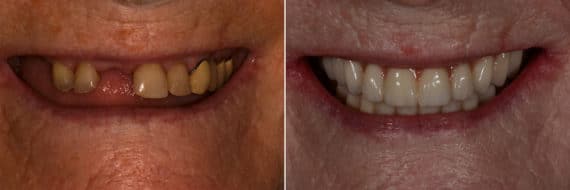
Have you ever wondered what the best tooth replacement option is for your smile — dental implants or dentures? With so many advancements in modern dentistry, patients now have more choices than ever when it comes to restoring missing teeth.
Whether you’re looking for something long-lasting or a more budget-friendly option, understanding the key differences between these solutions is essential. Keep reading to learn everything you need to know to make the right choice for your oral health and lifestyle.
Which is Better, Dentures or Dental Implants?
It depends. The right option for you will vary depending on your individual needs, goals, and budget. Dental implants are often considered the gold standard for tooth replacement because of their durability and natural look, but they also come with a higher upfront cost and may not be suitable for everyone. Dentures, on the other hand, are more affordable and less invasive prosthetic teeth, making them a good option for some patients. Let’s go through both teeth replacement options so you can feel confident in your decision.
Pros and Cons of Dental Implants
Dental implants have become one of the most trusted solutions for replacing missing teeth, offering both aesthetic and functional benefits. But while they’re often praised for their durability and natural feel, they may not be ideal for every patient. Let’s take a closer look at the advantages and potential drawbacks of this popular tooth replacement option.
Dental Implants Pros
Dental implants come with a range of advantages that make them a preferred choice for many patients seeking a permanent solution to missing teeth. Here are some of the standout benefits:
- Natural Appearance and Function: Implants look, feel, and function just like natural teeth, giving you the confidence to smile, eat, and speak freely.
- Exceptional Longevity: With good oral hygiene and regular checkups, dental implants can last a lifetime—making them a long-term investment in your oral health.
- Bone Health Preservation: Unlike other options, implants help maintain and stimulate jawbone structure, preventing the bone loss that often follows tooth loss.
- Enhanced Comfort and Performance: Because they are securely anchored, implants restore full chewing power and allow for clear, natural speech.
- No Need for Adhesives: Unlike removable dentures, implants stay firmly in place without the need for messy adhesives or pastes.
Dental Implants Cons
While dental implants offer many long-term benefits, they’re not without their limitations. Here are a few important considerations to keep in mind:
- Higher Upfront Cost: Implants typically cost more than dentures, especially when factoring in surgery, materials, and follow-up care.
- Surgical Requirement: The placement process involves oral surgery, which includes a recovery time and potential for discomfort during healing.
- Bone Density Needs: Adequate jawbone structure is essential for successful implantation. Patients with bone loss may need bone grafting before getting implants.
- Ongoing Maintenance: Just like natural teeth, implants require consistent brushing, flossing, and professional cleanings to prevent complications.
Pros and Cons of Dentures
Traditional dentures have long been a go-to solution for replacing missing teeth and remain a reliable option for many patients today. They offer flexibility and accessibility, making them an appealing choice for those looking for a non-invasive and affordable alternative to implants. They still may come with some limitations that may affect long-term comfort and functionality so let’s break down the benefits and drawbacks of choosing dentures for your smile restoration.
Dentures Pros
Partial dentures and complete dentures continue to be a practical and accessible option for replacing multiple missing teeth. Modern materials and designs have improved their comfort and appearance, making them a suitable solution for many individuals seeking a non-surgical approach.
- More Affordable: Dentures typically cost less than implants, making them an appealing option for patients on a tighter budget.
- Faster Treatment Timeline: Dentures can be fabricated and fitted in a relatively short amount of time compared to the surgical process required for implants.
- Removability for Easy Cleaning: Dentures can be taken out for thorough cleaning and maintenance, which some patients find convenient.
- Non-Surgical Option: Since no surgery is required, dentures are ideal for patients who may not be candidates for implants due to health conditions or bone loss.
- Customizable Fit and Appearance: Advances in dental technology allow dentures to be customized to closely match your natural teeth and gums for a more aesthetic smile.
Dentures Cons
Despite their accessibility and convenience, dentures do come with a few drawbacks that are worth considering before making your final decision. Here are some of the most common challenges associated with wearing dentures:
- Less Natural Look and Feel: Dentures can sometimes shift or feel bulky, and they may not replicate the natural feel of real teeth as well as implants do.
- Shorter Lifespan: On average, dentures need to be replaced every 5–7 years due to natural wear and changes in the shape of the jaw and gums.
- Potential Impact on Speech and Taste: Some wearers find that dentures can slightly affect their ability to speak clearly or diminish their sense of taste.
- Use of Adhesives: Many denture wearers rely on adhesives to keep them in place, which can be inconvenient or uncomfortable.
- Frequent Adjustments: As your mouth changes over time, dentures may require periodic adjustments to maintain a proper fit and prevent irritation.

Maintenance Comparison
Dental implants are maintained much like natural, healthy teeth. Daily brushing, flossing, and routine dental checkups are essential to prevent plaque buildup and protect the surrounding gum tissue. While implants are resistant to cavities, the health of your gums and bones is still crucial to their long-term success. With good oral hygiene, implants can last for decades without needing replacement.
Dentures, on the other hand, require a different type of care. They should be removed and cleaned daily to avoid plaque and bacteria buildup. It’s also important to soak them overnight in a cleaning solution to maintain their shape and hygiene. Over time, as your mouth changes, dentures may need to be relined or replaced to ensure a proper fit and avoid discomfort.
Which Tooth Replacement Option Benefits You the Most?
Dental implants are best suited for individuals looking for a long-term, stable, and natural-feeling solution. They’re ideal for patients with good overall health and sufficient jawbone density and those willing to invest in a more permanent solution. If you’re looking for a tooth replacement that blends seamlessly with your natural teeth and offers the highest level of function, implants are likely your best bet.
Dentures, however, may be a better fit for patients seeking a quicker, more affordable solution or those who may not be good candidates for surgery. They’re also well-suited for individuals missing multiple teeth who need a non-invasive option that restores their smile and oral function without the need for extensive procedures.
Before & After Photos


* All patients are unique and individual results may vary.
Schedule an Appointment With an Implant Dentistry Specialist
When it comes to tooth replacement procedures, choosing a qualified and experienced specialist makes all the difference. An expert will ensure that your treatment plan is customized to your needs, that any potential complications are minimized, and that your results look and feel natural. Your oral health and overall comfort should never be left to chance.
With an unwavering dedication to periodontics and implant dentistry, Dr. John Paul Gallardo, DDS, PA, is South Florida’s leading implant specialist. With over 25 years of experience and a state-of-the-art facility in Miami, Dr. Gallardo offers unparalleled care with techniques designed for long-lasting results and minimal downtime. Ready to take the next step? Call us at 305-447-1447 or visit our contact page to schedule your consultation today.
Dental Implants vs Dentures Questions
What is the Best Age for Dental Implants or Dentures?
There is no one-size-fits-all age for dental implants or dentures—it really comes down to oral health, bone density, and individual needs. That said, dental implants are typically recommended for adults whose jawbone has fully developed, usually around age 18 or older. Dentures, on the other hand, can be an option at almost any age when tooth loss has occurred and implants aren’t ideal due to health or financial factors.
What Type of Dentist Does Dentures and Implants?
Dentures and dental implants can be provided by general dentists, but for the highest level of precision and long-term success, it’s best to consult a specialist. Periodontists, like Dr. John Paul Gallardo, are experts in the supporting structures of the teeth and have advanced training in placing dental implants. As the head of Gallardo Periodontics and Implant Dentistry, Dr. Gallardo combines surgical expertise with restorative insight to deliver comprehensive, lasting solutions for patients seeking either implants or dentures.
Can You Get Dental Implants if You Have Full Dentures?
Yes, you can still get dental implants even if you currently wear full dentures. In fact, many patients transition from dentures to implants for improved stability, comfort, and function. Depending on your bone density and oral health, options like implant-supported dentures or a full arch of dental implants may be available. A thorough evaluation by a qualified implant specialist will determine the best approach for your needs.
How Often Will I Need to Visit the Dentist After Receiving Dentures or Implants?
For both dental implants and dentures, regular dental visits are essential to ensure long-term success. Patients with implants should visit their dentist at least twice a year for cleanings and checkups to monitor the health of the surrounding gums and bone. Denture wearers should also schedule routine appointments to check for proper fit and make any necessary adjustments. Staying on top of these visits helps catch issues early and keeps your smile healthy and comfortable.